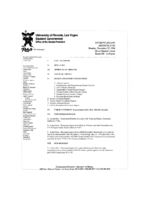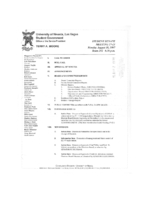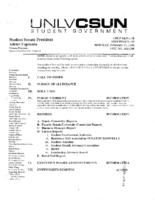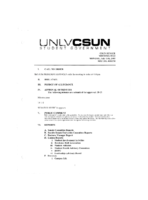Search the Special Collections and Archives Portal
Search Results
Central Credit, Inc. Records
Identifier
Abstract
The Central Credit, Inc. Records (1956-1987) contain meeting minutes, employee records, business ledgers, newspaper clippings, membership applications, photographs, and reports. Also included are incorporation papers, a Code of Ethics, Credit Law, Tod Early's personal calendars/diaries, and audiovisual materials. Central Credit, Inc. had branches in Reno, Las Vegas, and Lake Tahoe, Nevada, and also in London.
Archival Collection
Tonopah and Tidewater Railroad Records
Identifier
Abstract
The Tonopah and Tidewater Railroad Records (1905-1977) contain correspondence, purchase requisitions, bills of lading, freight reports, and waybills. Also included are a ledger book, a rubber stamp, and a booklet, "Diagrams of Locomotives and Tenders." Incorporated in 1904, the Tonopah and Tidewater Railroad operated for 35 years, connecting Ludlow, California with Beatty, Nevada by way of Death Valley on the Santa Fe Railroad main line. The records are concentrated on the later years of the railroad from 1930 to 1940.
Archival Collection
Frank Williams Papers on Early Nevada
Identifier
Abstract
The Frank Williams Papers on Early Nevada (1892-1946) consists of manuscripts written for the most part by Frank Williams, an early resident of Southern Nevada. The collection includes Williams' autobiography as well as histories of Goodsprings, Potosi Mine, Mesquite Valley, and the Yellow Pine Mining districts. Finally, this collection contains reports and material reflecting Frank Williams' two terms as University Regent (1909-1912 and 1923-1942) at the University of Nevada, Reno, and his four terms in the Nevada State Assembly.
Archival Collection
Danny Cassella Collection of Sheet Music
Identifier
Abstract
The Danny Cassella Collection of Sheet Music (1940s-1960s) consists of stock arrangements for songs and scores from the 1940s through the 1960s. The arrangements were collected by musician Danny Cassella. Additionally the collection contains several Tune-Dex cards.
Archival Collection
Marge Jacques Papers
Identifier
Abstract
The Marge Jacques Papers (1960-1990) comprise the personal papers of Marge Jacques, a prominent member of the Las Vegas, Nevada gay and lesbian community, and owner of the gay bar, Le Cafe. The papers contain correspondence, licensing records, financial statements, and artifacts from clubs that Jacques owned or managed. Also included are photographs, videotapes, audiotapes, newspaper clippings, and Gipsy Nightclub promotional material.
Archival Collection
Joseph "Wingy" Manone Papers
Identifier
Abstract
The Joseph "Wingy" Manone Papers (1934-1996) include a partial draft of his autobiography, newspaper clippings, correspondence, magazine articles, and press releases related to his musical career. Manone also wrote music, some of which is included in the collection.
Archival Collection

Meeting minutes for Consolidated Student Senate University of Nevada, Las Vegas, November 25, 1996
Date
Archival Collection
Description
Text

Meeting minutes for Consolidated Student Senate University of Nevada, Las Vegas, August 18, 1997
Date
Archival Collection
Description
Text

Meeting minutes for Consolidated Student Senate, University of Nevada, Las Vegas, February 27, 2006
Date
Archival Collection
Description
Text

Meeting minutes for Consolidated Student Senate, University of Nevada, Las Vegas, July 11, 2005
Date
Archival Collection
Description
Text
